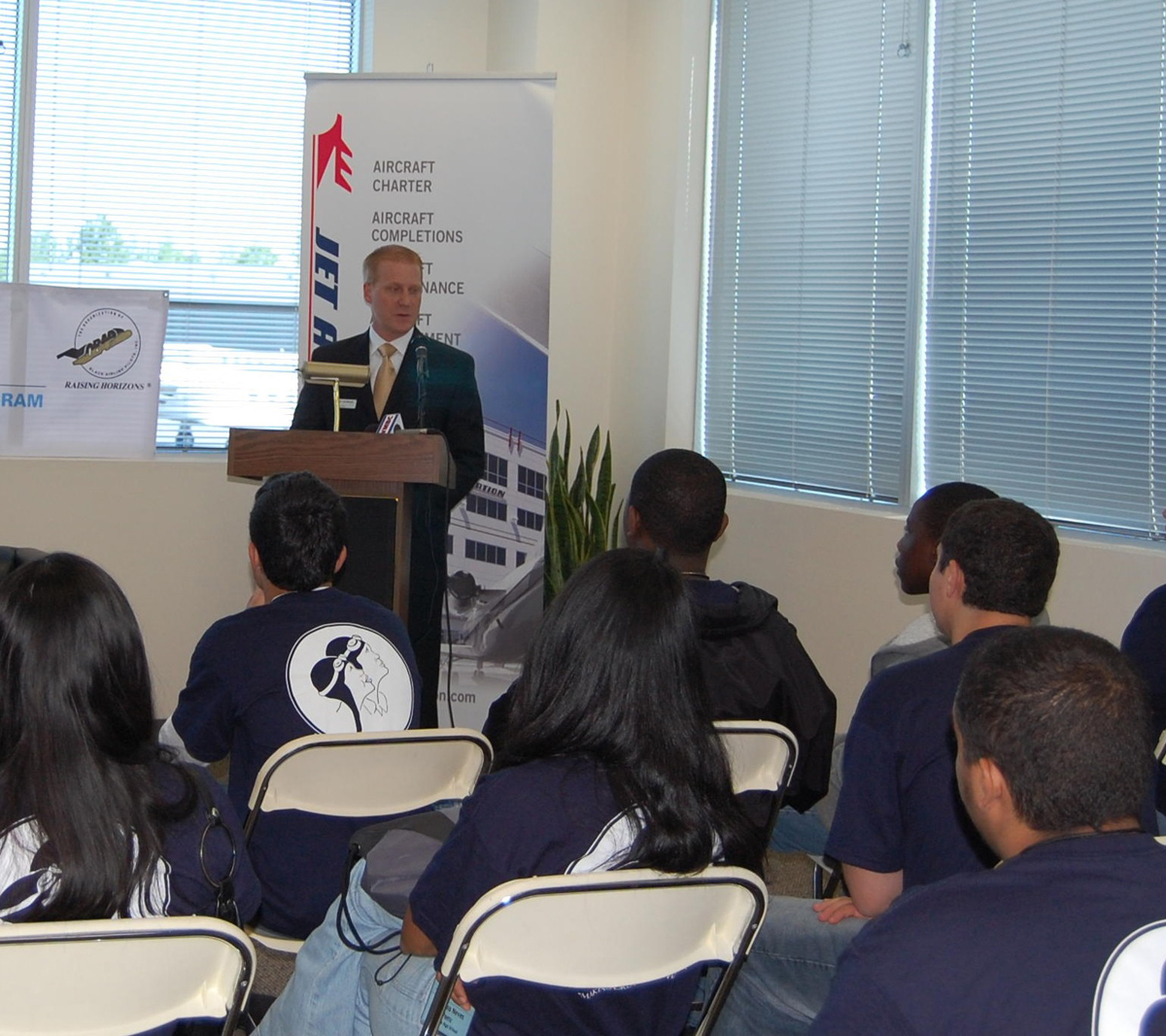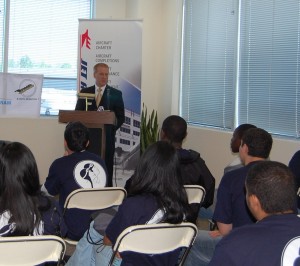
Patrick Sniffen, vice president of marketing and communications for Jet Aviation, explains to the ACE campers what they can expect at Jet Aviation’s FBO.
By Henry M. Holden
During the week of May 12, “the sky’s the limit” was in the hearts and minds of 20 high school freshmen from Newark, N.J. They experienced an up-close look at aviation, most of them for the first time, during the Newark Aviation Career Education Camp, established by the Organization of Black Airline Pilots. OBAP, founded in 1976, is a nonprofit organization with goals of motivating young people to become educationally prepared for life, and of increasing minority participation in aviation through exposure, mentoring, training and scholarships. During the last 15 years, OBAP has established 20 camps throughout the country.
New Jersey’s first OBAP-sponsored camp
This year’s ACE Camp, the first in New Jersey, included visits to Jet Aviation at Teterboro Airport (TEB), Newark Airport (EWR), Flight Safety International and the Aviation Hall of Fame & Museum of New Jersey.
During the five-day camp, students met and spoke with pilots, navigators, air traffic controllers, maintenance people and engineers who work in the careers the youths may want to explore. Discussions included aviation history, theory of flight, model aircraft building, women in aviation, aviation speakers, entrepreneurship, starting an airline and the Wall Street financial side of aviation. Students had an opportunity to tour inside business jets and take orientation flights, where the student sits in the left seat of a small aircraft that they’re flying (under instructor supervision).
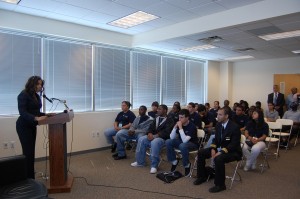
Pamela M. Jasper, director of the OBAP Newark ACE Camp, is one of only 15 black female pilots in New Jersey. Her goal is to expose young people to all aspects of aviation and careers as possible.
Jet Aviation, a leading worldwide business aviation services company, gave the campers a behind-the-scenes tour of its U.S. headquarters at TEB.
“This is what we call a fixed base operation, or an FBO,” said Patrick Sniffen, vice president of marketing and communications for Jet Aviation. “We’re going to show you what goes on here. You’ll see some maintenance work, meet some pilots and go inside some business jets.
“The aviation field is wide open with opportunities. Space has unlimited opportunities for science and exploration. Enthusiastic, hard-working dreamers like you will become the visionaries and explorers in a few short years. Today, your possibilities are endless, and we’ve only scratched the surface of aviation’s possibilities.”
Pamela M. Jasper, director of the OBAP Newark ACE Camp, is one of only 15 black female pilots in New Jersey. Her goal is to expose young people to all aspects of aviation and related careers as possible.
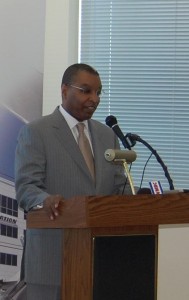
The Rev. DeForest Soaries believes each of the students has a special gift and a special talent. Each youth can do something better than anyone else, and it will be something they love to do.
“I started thinking about aviation a long time ago, when I’d look out the window with my grandmother, who lived in Brooklyn, and watch aircraft landing at JFK,” said Jasper. “As an adult, living in Newark, I still get to see the aircraft lined up on final approach into Newark Airport. I thought, ‘There are probably so many people in this town who also see the airplanes, but have no idea what’s going on behind the scenes at an airport, or in the cockpit of a jet.’ That’s why I’ve focused the camp, at least for now, at Newark. My hope is to inspire all of these young people to their greatness. I want them to always follow their dreams and to know that the sky’s the limit.”
Rev. DeForest Soaries cares about these young minds.
“Pam’s message to you is to always follow your dreams,” said Soaries, a former New Jersey secretary of state. “She had a passion and a dream to make this camp a reality, and none of us would be here today if not for Pam. Life happens very quickly. One day you find yourself in kindergarten, and the next day you’re here in high school. Today you’re looking at airplanes and before you know it, you’ll be looking for a job. Today is a special day for you. Unlike all the friends you have, and unlike all the other young people in this region, you are connected to people here who really care about your future.”
Soaries was on a speaking tour when he faced some tough kids.
“Several years ago I was in Texas to speak at a high school. The principal said that I was going to be speaking to only the worst kids in the school. There were about 20 of them, and he said he didn’t care what I said. ‘Just teach them something, anything,’ he said. These kids were so bad the principal refused to go into the room with me. I wondered, ‘Who are these kids that made the principal so afraid?’
“I peaked though the little window in the door expecting them to have Uzis or grenades. They looked like normal kids, just like you—Hispanic, black, white, boys and girls. They were calm, there was no violence, there was no blood and the windows were not broken.
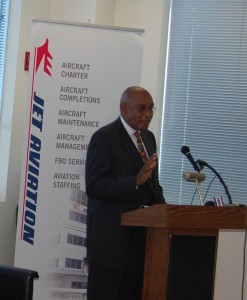
Clarence Beverley, comedian Bill Cosby’s pilot, remembers the day he started his career in aviation. He has more than 40 years in aviation and can’t recall a day in his career when he didn’t want to go to work.
“I walked into the room, and since the principal hadn’t introduced me, I decided just to tell them my own story. I began by saying I was born in Brooklyn, but we moved to New Jersey. We had rats in our house that we’d given names because we thought they were pets. My sixth grade teacher told me that I’d never finish high school, and if I did, I’d be going to jail. When I became secretary of state, I sent that woman my business card and told her I was doing better than she was. I told her about my college degrees and that I’d been invited to the White House. What I was really trying to say to her—and all the others who think like her—and what we’re all trying to say to you today, is that if we could make it from where we started, to where we are today, then you can do anything, and you surely can be successful in this business.”
These children were supposed to be the worst in the school, but they had hidden talents.
“One young girl raised her hand and asked if it was all right to go to a concert without a ticket,” said Soaries. “Everybody in the class started laughing. She had set me up, and I was embarrassed. So I decided to answer her question. ‘Look,’ I said. ‘I have three college degrees, I’ve been all over the world, I’ve been in government, and I have a large church. Based on everything I know, if you don’t have a ticket, you don’t go. She looked at me and said, ‘I already went.’ The rest of the kids were howling, so I decided to challenge her. ‘Without a ticket, how did you get in?’ She said, ‘My friend had a ticket, so I got some cardboard and drew a copy of it and it got me in.’ I didn’t believe her, so she showed me the stub. Her ticket looked more like a ticket than a real ticket.
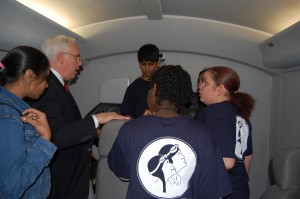
John Kelleher, assistant manager of Flight Safety’s Learning Center in Teterboro, describes the inner workings of a Dassault Falcon simulator to the students.
“I told her that according to her principal, she was one of the worst kids in the school, but I didn’t believe it. I went on to say. ‘With the kind of talent you have, you could make so much money you could give your own concerts.’ I was no longer angry with her or the other kids, but at the principal. He didn’t recognize the talent he had in his school. When I got home, I sent her books on graphic design and architecture. I wanted her to begin thinking. And I want each of you to start thinking. Each one of you has a special gift and a special talent. Each one of you can do something better than anyone else on the planet can do it. It’s something you love to do. It doesn’t matter what people think about you. What matters is that you decide today what that is. If it’s in aviation—or even if it’s not—when you look back, you’ll be able to appreciate this week. I just want you to remember that great song, “I believe I can fly, I believe I can touch the sky.” This week everyone here is committed to helping you ide
ntify your gifts, and in the spirit you leave here today, believing you can fly.”
Clarence Beverley never dreamed he’d fly an airplane.
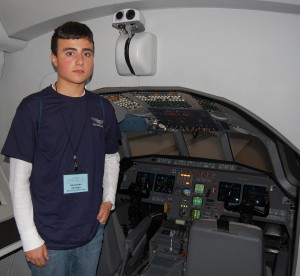
After spending several minutes in the simulator, Alexandre Almeida said he knew what he wanted to be when he grew up—a pilot.
“I can remember the day I started my career in aviation,” said Beverley, comedian Bill Cosby’s pilot for 22 years. “I was living in south Jersey, and one day I went for a bike ride. I had ridden my bike three miles from home when I stopped to watch a little, yellow airplane landing near a vegetable field. When the farmer landed, he asked me if I wanted to go up in his J-3 Cub. Here I am, a young kid from a poor family, and I never thought I’d ever go up in an airplane. Next thing I know, we’re flying low over the vegetable fields. When we landed, I ran the three miles home to tell my mother that I had gone up in an airplane. I was so excited I forgot my bike. She was happy, and my father thought I was crazy for doing it. But it was my friends that I had to deal with. I told them, ‘I’m going to learn to fly; I’m going to become a pilot.’ My friends, well you know how school kids are—they’ll beat you down if you let them. They said ‘What are you talking about? Where are you going to get the money? You’re not sm
art enough to be a pilot. You can’t do it.’ I just kept saying, ‘I’m going to do it,’ but nobody believed me. And I didn’t know how I was going to do it either, but I knew that somehow I was going to do it. I got $10 together, went back to the farmer and took my first lesson. The second lesson came about a month later when I had earned enough money.”
One day, his uncle took him to Philadelphia, where he met a captain.
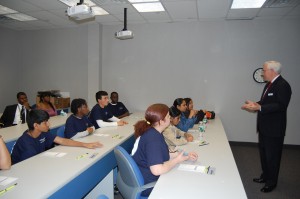
John Kelleher describes all the jobs that Flight Safety offers, from accounting to aviation law to electronic maintenance of the simulators. The students gained an appreciation that aviation careers go well beyond piloting.
“He walked up to me and touched me on the head,” he recalled. “I thought the hand of God had touched me. After that, there was no stopping me. How was I going to become a pilot? I had no idea. After I finished high school, I heard Ohio State had a school of aviation. After several months of them evaluating my application, I was accepted into its flight program. I got my private pilot, commercial and instrument ratings. I guess I did well, because the chief pilot of the school and the chief flight instructor had me teach their wives to fly. Everyone did whatever he or she could to help me get through the program.”
After college, he worked with the FAA and then for TWA.
“How this next thing in my life happened, I never knew,” he said. “Air America was looking for pilots, and CIA asked me if I wanted to go to Southeast Asia. I’d wanted to travel all my life, so I signed up. A few years later, I was in Saudi Arabia, and I got a call asking if I wanted to fly the Gulfstream jet. At first, nobody wanted to tell me who the owner was, but eventually I found out it was Bill Cosby. I didn’t know if I wanted the job, because I had an excellent job flying in Europe, Asia and Africa. When they introduced me to Mr. Cosby, and he told me that I would be in charge of the operation, I decided that I’d accept. I’ve been in aviation for more than 40 years, and I have more than 23,000 flight hours. It’s been a wonderful career. I can’t recall a day in my career when I didn’t want to go to work.
“Aviation is many things. Don’t just think of flying. There are the air traffic controllers, which I think is one of the most fantastic jobs out there. There are the maintenance people. We couldn’t fly if it weren’t for them. What I’m saying is that if you want to do something—I don’t care who you are, or how little money you have—there are ways of doing it. There are programs out there. There are people looking to help you, like these folks here today.”
Flight Safety tour
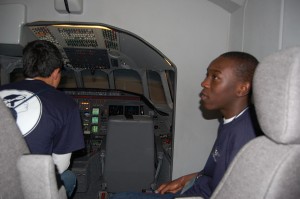
Kingsley Akunor sits in the simulator, fascinated by the description of how a simulator recreates a flight. All of the students were amazed at how the simulators can create any weather condition so realistically.
The students toured Flight Safety International, a company that provides simulator training in jet aircraft to professional pilots.
“Flight Safety teaches pilots how to fly the big business jets,” said John Kelleher, assistant manager of Flight Safety’s Learning Center in Teterboro. “There’s a lot that goes into flying one of these jets, so the pilots come back every six months for a refresher course. The simulators are all computers, so we need people who like to work on computers. Many jobs in aviation don’t involve flying.”
Kelleher described some of the costs.
“If you wanted to come here for training, it would cost about $35,000 a year. You probably wonder who pays for this training. Corporate aviation is not just about flying large companies, but also about people who own EBay and Google and other companies. They have schedules that mean they have to be places in a hurry. They can’t wait in long lines at the airports, so they don’t mind spending $55 million on an airplane and investing another $5 million a year on keeping the plane and pilots busy.
“All the people you’ve seen in this building and on the rest of the tour all have one thing in common—an education. It’s likely you won’t be able to become a professional pilot without a college education. All of the jobs you’ve seen here involve some level of education above a high school diploma. As a previous speaker has said, if you really want to be something in this industry, there are people who are willing to help you. All you have to do is ask.”
For more information, visit [http://www.opab.org].











